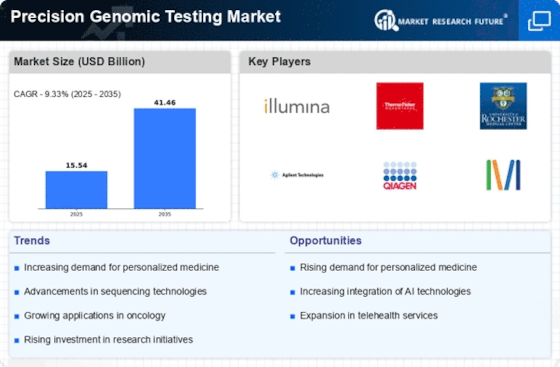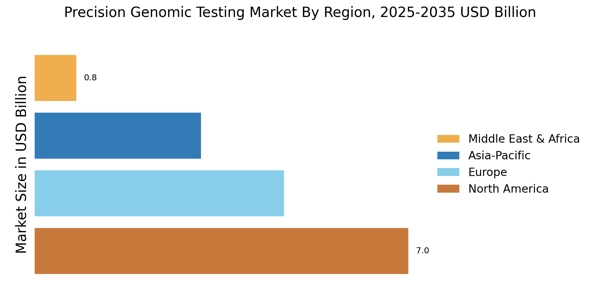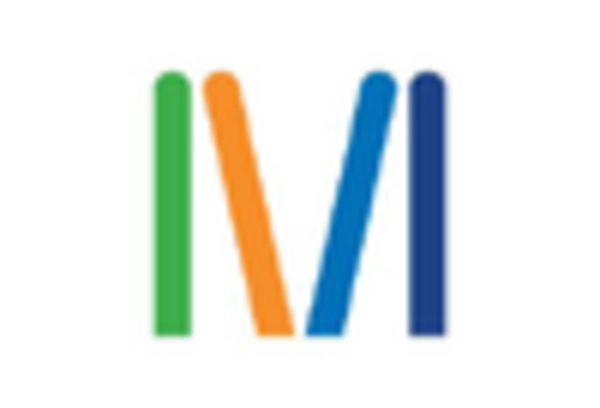Advancements in Genomic Technologies
Technological innovations are transforming the landscape of the Precision Genomic Testing Market. The advent of next-generation sequencing (NGS) and CRISPR technology has revolutionized the ability to analyze genetic material with unprecedented accuracy and speed. These advancements not only facilitate comprehensive genomic profiling but also reduce the costs associated with testing. For instance, the cost of sequencing a human genome has plummeted from over 100 million dollars to less than 1,000 dollars in recent years. Such developments are likely to drive the adoption of genomic testing across various healthcare settings, as clinicians seek to leverage these technologies for improved diagnostic capabilities and personalized treatment strategies.
Rising Investment in Genomic Research
Investment in genomic research is a critical driver for the Precision Genomic Testing Market. Governments and private entities are increasingly allocating funds to explore the complexities of the human genome, aiming to unlock new therapeutic avenues and enhance diagnostic accuracy. For instance, funding initiatives have surged, with billions of dollars directed towards genomic research projects worldwide. This influx of capital not only accelerates the development of innovative testing methodologies but also fosters collaborations between academic institutions and industry players. As research continues to unveil the intricacies of genetic information, the Precision Genomic Testing Market is likely to benefit from a steady stream of novel applications and technologies.
Growing Demand for Preventive Healthcare
The shift towards preventive healthcare is significantly influencing the Precision Genomic Testing Market. As awareness of the importance of early detection and prevention of diseases increases, more individuals are opting for genomic testing to assess their risk for hereditary conditions. This proactive approach is supported by a growing body of evidence linking genetic predispositions to various health outcomes. The market is projected to witness substantial growth, with estimates suggesting a compound annual growth rate of over 10% in the coming years. This trend reflects a broader societal movement towards health optimization, where genomic testing plays a crucial role in informing lifestyle choices and medical interventions.
Evolving Consumer Awareness and Education
Consumer awareness regarding genetic testing is evolving, significantly impacting the Precision Genomic Testing Market. As individuals become more informed about the implications of their genetic makeup, there is a growing demand for accessible and reliable testing options. Educational campaigns and resources provided by healthcare organizations are instrumental in demystifying genomic testing, thereby encouraging more people to seek these services. This heightened awareness is expected to drive market growth, as consumers increasingly recognize the potential benefits of genomic insights in managing their health. The Precision Genomic Testing Market stands to gain from this trend, as informed consumers advocate for personalized healthcare solutions.
Increasing Prevalence of Genetic Disorders
The rising incidence of genetic disorders is a pivotal driver for the Precision Genomic Testing Market. As more individuals are diagnosed with conditions such as cystic fibrosis, sickle cell anemia, and various hereditary cancers, the demand for precise genomic testing escalates. According to recent estimates, approximately 1 in 10 individuals may be affected by a genetic disorder, underscoring the necessity for advanced testing solutions. This trend compels healthcare providers to adopt genomic testing as a standard practice, thereby enhancing patient outcomes through tailored treatment plans. The Precision Genomic Testing Market is thus positioned to expand significantly, as healthcare systems increasingly recognize the value of early detection and intervention in managing genetic conditions.

















